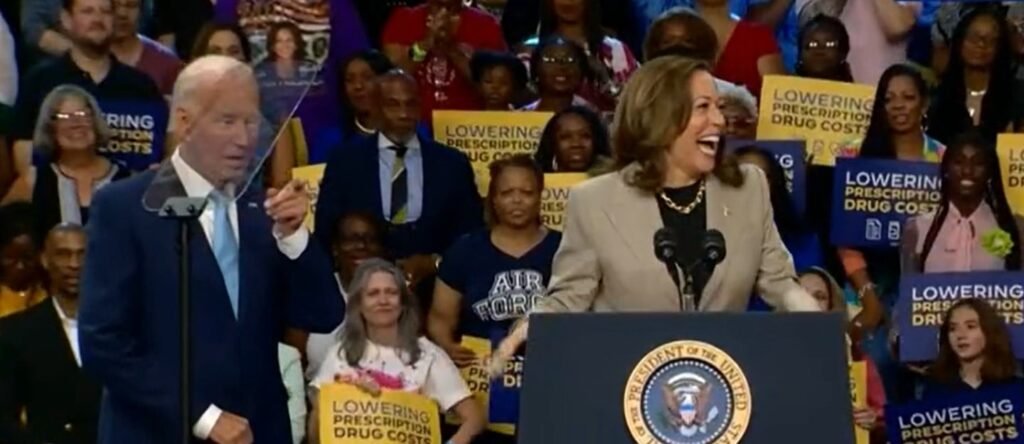When the left runs out of alternatives, they resort to foolish tactics and come up with outdated measures like price controls, which is exactly what Vice President Kamala Harris has proposed for food.
Price controls have been tried in many countries over the years and have always failed miserably. Whether it be wages, gasoline prices or food prices, the basic economics of price controls apply and cannot be violated. This is a conclusion that nearly every reputable economist, regardless of political leaning, agrees with. As former Obama administration economist Jason Furman put it, with a flair for understatement: “This is not a wise policy.“
Harris is following in the footsteps of President Richard Nixon, though he probably doesn't realize it. When inflation began to rise in the 1970s, Nixon responded by temporarily freezing many wages and prices. Predictably, that temporary freeze became an indefinite freeze and was expanded in scope. (Related: 'A whole lot of boring talk': Larry Kudlow says 'No one understands what Harris means when he blames price gouging for inflation')
Over time, an ever-widening gap emerged between the frozen prices and the prices that would have been obtained under normal market forces. This gap created distortions that hindered decision-making among households and businesses and led to growing dissatisfaction with the resulting shortages and a knock-on economic weakening.
As discontent grew louder, politicians relented and relaxed most price controls. As a result, markets stabilized, supplies replenished, and prices normalized. But energy price controls remained, leading President Jimmy Carter to restrict gasoline purchases and resulting in the famously long lines at gas stations. All goods and services are rationed, either by price or quantity. If you freeze prices, rationing is by quantity.
President Ronald Reagan Obsolete During the energy price controls of the 1980s, energy prices initially rose, but then demand fell and production surged. As the theory predicted, energy prices soon fell sharply and stabilized. Nowadays, the only time you see a line is when a discount station has a sale.
What would happen if Harris' food price controls were implemented? The result would be greater price distortions and a shrinking food supply. Farmers do not voluntarily farm at a loss, and grocery stores do not usually stock products that will cause them to lose money. There is little point in selling products at low prices that are so scarce that one would think one would look at empty grocery store shelves in Cuba.
Harris claims to be focused on grocery price gouging. Perhaps someone on her staff should point out that grocery stores have the lowest profit margins in all of retail.
Democratic presidential candidate and U.S. Vice President Kamala Harris speaks during a campaign rally at the United Auto Workers Local 900 in Wayne, Michigan, August 8, 2024. Kamala Harris and newly selected vice presidential candidate Tim Walz have been campaigning across the country this week. (Photo by Andrew Harnick/Getty Images)
If she thinks food prices are too high, she knows it, because it was her and Biden's policies that drove food prices up – specifically, the policies that caused inflation to spike in the first place.
Thanks to Biden-Harris inflation, Inflation-adjusted earnings are down almost 4%. Since Biden-Harris took office. This amounts to a loss of about $2,000 per year.Sure, inflation-adjusted incomes are finally rising and inflation is falling, but the Biden-Harris hole families are trying to climb out of is deep. (Related: The good, the bad and the ugly: Biden's climate change bill enters its second year)
This hole is in the polls 59% of Americans believe there is a recession The usual indicators like employment and GDP show the economy is growing. Families are in recession, struggling with their budgets. Price controls and the distortions that come with them can't fill the hole.
A silly idea like price controls is like cotton candy to a child: it looks good but has no substance, just a sugary sting and a sticky mess that has to be cleaned up afterwards. It's not a good sign when Harris goes for the cotton candy. It's probably because Her Father Was Marxian Economics Professor She finds the Cuban example compelling.
J.D. Foster, a former chief economist for the Office of Management and Budget and former chief economist and senior vice president for the U.S. Chamber of Commerce, now lives a life of relative freedom in the hills of Idaho.
The views and opinions expressed in this commentary are those of the author and do not necessarily reflect the official position of the Daily Caller News Foundation.
As an independent, nonpartisan news service, all content produced by the Daily Caller News Foundation is available free of charge to any legitimate news publisher with a large readership. All republished articles must include our logo, reporter byline, and affiliation with the DCNF. If you have any questions about our guidelines or partnering with us, please contact us at licensing@dailycallernewsfoundation.org.
















